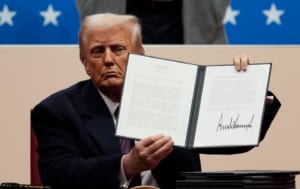


Less than 2 hours after President Donald J. Trump signed an Executive Order (“EO”) attempting to end birthright citizenship, immigrant advocates started to file lawsuits in Federal Court attempting to block Trump’s Executive Order. The first lawsuit was filed in the U.S. Federal District Court of New Hampshire on behalf of a group representing Indonesian migrants in the State. It was signed by a total of twenty-six (26) attorneys representing the American Civil Liberties Union, State Democracy Defends Fund, the NAACP Legal Defense & Educational Endowment Fund, League of United Latin American Citizens and Make the Road New York as plaintiffs. Following New Hampshire, more than two dozen additional lawsuits were filed against the EO in Federal District Courts contending that the EO violates the U.S. Constitution’s 14th Amendment, U.S. Supreme Court precedent since 1898 (United States v. Wong Kim Ark), as well as federal law which has been practiced

One your fiance arrives in the United States on a K-1 visa and you are married within ninety (90) days upon arrival, you and your fiance will need to file for adjustment of status with the United States Citizenship and Immigration Services (“USCIS”) in order to convert the K-1 fiance nonimmigrant visa status to lawful permanent resident status. As part of the adjustment process, applicants have the option of filing a Form I-131, Application for Travel Documents, Parole Documents, and Arrival/ Departure Records with their Form I-485, Application to Register Permanent Residence or Adjust Status. Approval of the Form I-131 will result in Advance Parole allowing for international travel while waiting for USCIS to approve the Form I-485. Applicants also have the option to file a Form I-765, Application for Employment Authorization (“EAD”) while USCIS adjudicates the adjustment application. Once the EAD is approved, they will have valid status and

Once the United States Citizenship and Immigration Services (“USCIS”) approves an I-129F Petition for Alien Fiancé, the foreign fiancé typically has four (4) months to apply for a K-1 fiancé visa at a U.S. Embassy or Consulate. However, due to the time that it takes for an approved petition to be sent and received by the National Visa Center and then forwarded to the foreign fiancé’s embassy or consulate where he/she will undergo a visa interview, petition revalidation is possible. While the interviewing consular officer will often automatically revalidate an expired petition, demonstrating ongoing intent that the U.S. citizen and foreign fiancé intend to marry within ninety (90) days upon the foreign fiancé’s arrival in the United States may be requested. The rationale behind requesting updated documentation showing continued marital intent is to ensure that the couple’s bona-fide relationship remains current and genuine. It further helps to reduce prolonged processing
Copyright 2012 – 2024 Enterline and Partners Consulting | All Rights Reserved



